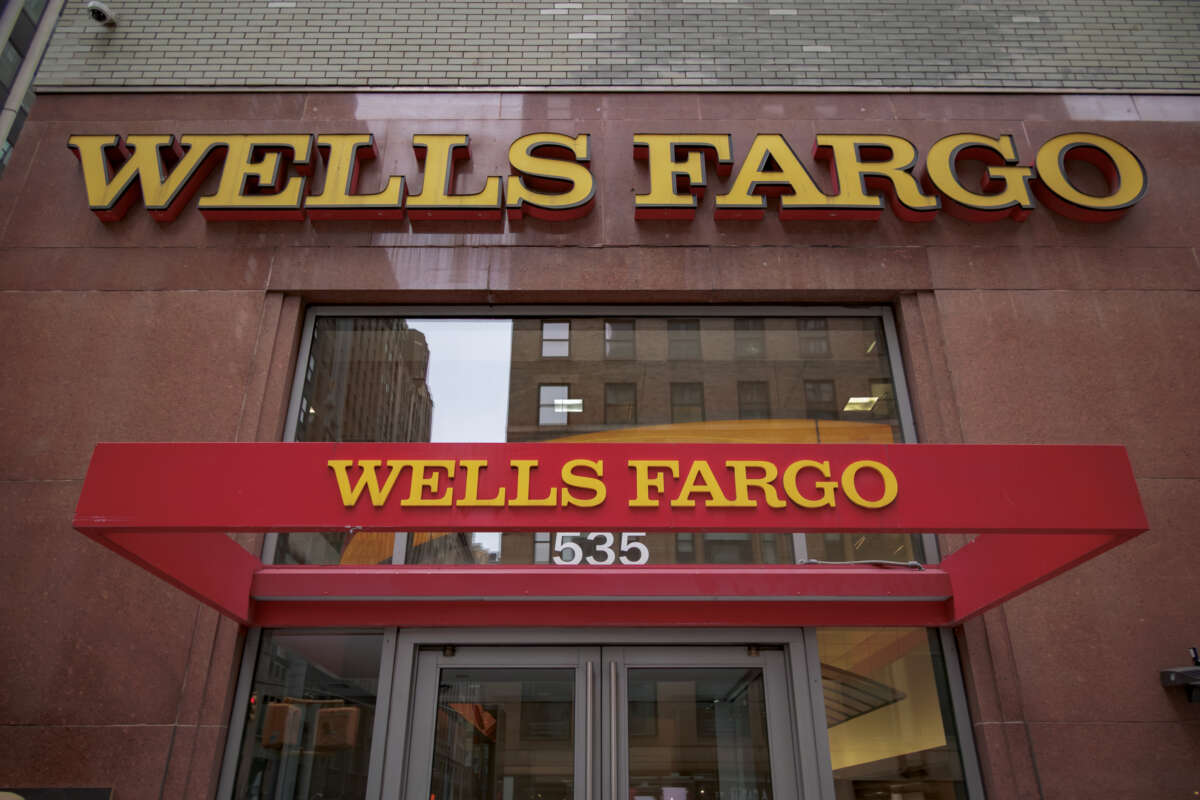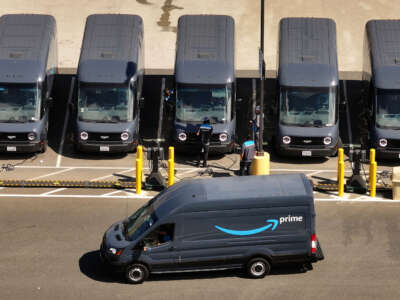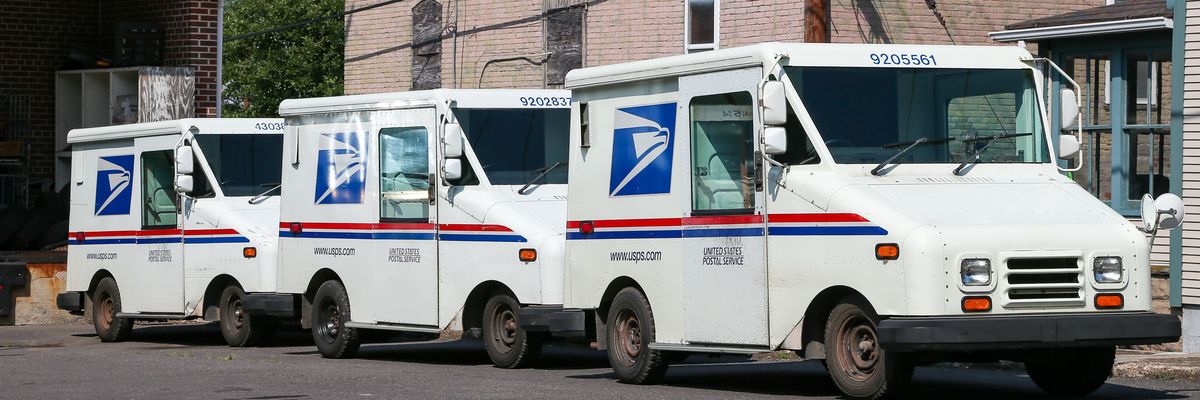Why would a mega bank with one of the worst reputations in a scandal-ridden industry take over a popular institution?
By Terri Friedline ,

The United States Postal Service (USPS) is a front line in the struggle for democracy and justice against corporate power, as a memo released by Wells Fargo unveils. Published February 27, the memo outlines a plan for privatizing the USPS and enabling investors to reap the profits. The plan has been met with criticism and protest, since achieving profitability relies on selling off property, firing workers, limiting or eliminating services, and raising parcel rates by up to 140 percent. At the end of March, senators introduced a resolution calling on Congress to affirm the USPS as an independent agency and protect it against privatization.
Wells Fargo outlines challenges to implementing their plan, including that legislation needed for privatization is unlikely to pass through Congress, support for the USPS remains high especially among rural communities and investors in a privatized USPS would need to contend with “nine collective bargaining agreements with seven unions covering 550,000 employees.” But the mega bank has solutions for each of these challenges.
First, it suggests using a reconciliation bill that would only require a simple majority of votes to pass through the Senate, aggressively limiting or eliminating services to frustrate public support, and undercutting unionized labor by laying off workers and slashing benefits.
In laying out its privatization plan, the bank is returning to a previous, historical ambition: Wells Fargo was founded in 1852 by stagecoach mail delivery executives, Henry Wells and William Fargo. Wells and Fargo wanted to capitalize on the California gold rush and used stagecoaches to ship gold and deliver mail and other supplies between outposts and mining towns scattered across the state. Over the decades, Wells Fargo merged with other “pony express” mail services to monopolize delivery. The westward expansion of the railroads eventually ended the bank’s reign over mail delivery, but Wells Fargo’s interests in USPS remain centered on capitalization and monopolization.
Steps toward privatization may already be underway. Before resigning from his position, Postmaster General Louis DeJoy signed an agreement with Elon Musk’s “Department of Government Efficiency” — the pseudo agency finding efficiencies in the federal government on the backs of public-sector workers — and announced the elimination of 10,000 jobs.
Related Story

As Trump Pushes Privatization of USPS, Amazon May Be Preparing to Take Over
A new CEO statement from Amazon suggests it could be angling to take over the US Postal Service. By Jonathan Rosenblum & Benjamin Y. Fong , Truthout May 6, 2025
USPS took a big step toward privatization on May 9, when the USPS Board of Governors announced that FedEx official David Steiner would become the next Postmaster General. Steiner was favored by President Donald Trump to lead the agency, despite the clear conflict of interest appointing a senior executive from a USPS competitor.
Privatization Is an Attack on Democracy
It’s a special kind of irony that a mega bank with one of the worst reputations in an industry where the bar is embarrassingly low wants to take over a broadly popular federal agency. The truth is, we need the USPS. We do not need Wells Fargo.
If there’s a federal agency that exemplifies democracy’s potential, it’s the USPS. The USPS delivers to every address in the country, without exception. No matter who you are or where you live, the USPS delivers birthday cards and love letters, including to people who are incarcerated in jails and prisons. Election ballots are sent through the mail, where people make choices about who will represent their concerns in the halls of political power. Prescription medication and abortion pills are received in the mail, providing people with access to health care and reproductive justice. Tax refunds, social security and stimulus checks arrive in the mail, offering people some financial security in a volatile economy. Seeds and saplings are delivered through the mail, making the USPS a partner in environmental justice efforts. The USPS even transports insects and live animals, including honeybees and baby chicks that sustain local food and agriculture.
What’s more, the USPS employs workers at competitive wages and with union representation. These wages and benefits are hallmarks of working conditions and benefits won through organized labor, where workers express their collective power and fight for dignity on the job. Postal workers earn a median wage that is higher than the national average and receive benefits like health care and paid leave. With Black employees making up 29 percent of its staff, the USPS has played an important role in building the Black middle class (perhaps a reason President Donald Trump and Musk have the agency in their crosshairs, given the administration’s anti-Black and segregationist agenda). Moreover, since formal education is not required to become a postal service worker, the USPS is one of the few places where workers can earn decent pay regardless of education level.
As I’ve written before, we should be imagining the dismantling of Wells Fargo, not the privatizing of the USPS.
Wells Fargo is an enormously unpopular bank well-known for its scandalous business practices. On a 2023 ranking of the 100 largest publicly traded banks, factoring criteria like credit quality and profitability, Wells Fargo came in last place. Two years later, it didn’t even make the list. The mega bank has been charged billions of dollars in fines and penalties from regulators for repeated wrongful and illegal practices, including foreclosing on people’s homes, repossessing vehicles, and overcharging fees and interest. The bank is fodder for comedy routines and an easy target for activists and policy makers wanting to express their displeasure with the finance industry overall.
A bank that has kicked people out of their own homes and deprived people of their livelihoods now wants to undermine the public service that delivers the mail, too. If Wells Fargo and private investors get their way, more expensive parcel rates would be only one of many concerns. One place to look for understanding just how much privatization can cost are the experiences of people who are incarcerated.
For people locked behind bars, mail and phone calls are lifelines to the outside world. But, they’re expensive to get. Phone calls are especially costly, in part because these services have been monopolized by private telecommunications companies taking advantage of captive populations. In some jails and prisons, telecoms charge $1 per minute for phone calls. One 15-minute phone call can easily cost as much as $25 — an outlandish price for the human right of communicating with loved ones. In 2024, the Federal Communications Commission intervened and issued a rule cutting costs for phone calls in jails and prisons. Under the new rule, a 15-minute phone call now costs between 90 cents and $1.35.
If the USPS is privatized, we can expect private investors to raise prices on stamps and parcel rates in the same way telecoms have made their profits off people who are incarcerated. Instead of the promise to deliver to every address, your zip code will matter more than ever. Rural communities, communities of color and poor communities will likely pay the highest rates for mail delivery, since, like incarceration, residential segregation aids in identifying groups of people for exploitation.
Instead of privatizing the USPS, we should be expanding its public services. For example, the USPS can expand the financial services it already provides. The agency sells over $21 billion in money orders every year and, between 1911 and 1967, operated a popular banking system out of the nation’s post offices. At its height, nearly 4 million people held $3.4 billion in interest-bearing accounts (over $50.5 billion in today’s dollars). People made deposits and purchased savings bonds alongside sending and receiving mail. However, President Lyndon B. Johnson ended postal banking as sales from defense bonds waned after World War II, bank lobbyists applied pressure, and people went elsewhere for financial services.
It’s certainly possible the USPS is better at offering these financial services than Wells Fargo, given the bank’s massive “fake accounts” scandal, where employees, under pressure to meet aggressive sales quotas, opened bank accounts for people without their knowledge and then charged excessive fees. In fact, rather than privatization, the USPS could be expanded to operate a public banking system again — a timely idea since private banks are facing less regulatory oversight from the Consumer Financial Protection Bureau to rein in their costs and fees.
The USPS is an agency where struggles for democracy and justice converge. If you care about organized labor, you care about the USPS. If you care about climate change, you care about the USPS. If you care about racial, economic and reproductive justice, you care about the USPS. If you care that your grandma receives her social security check, you care about the USPS.
Wells Fargo does not care about any of these things. Don’t let it privatize the USPS.
There are a few things you can do to take action and save the USPS. Sign a petition, call your senators, host a teach-in event in your community or record a video about what the USPS means to you. Tell Wells Fargo and the Trump administration to get their hands off the USPS.
This article is licensed under Creative Commons (CC BY-NC-ND 4.0), and you are free to share and republish under the terms of the license.
Terri Friedline writes, organizes and teaches about racial capitalism, technology and the financial system. She is a professor of social work at the University of Michigan and is the author of Banking on a Revolution: Why Financial Technology Won’t Save a Broken System (Oxford University Press).










